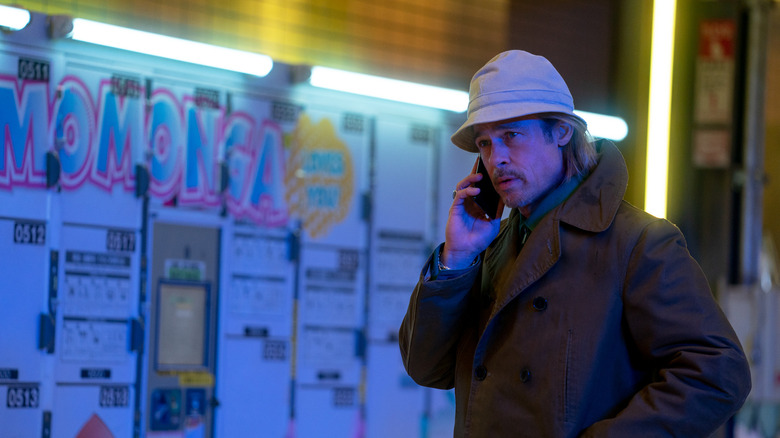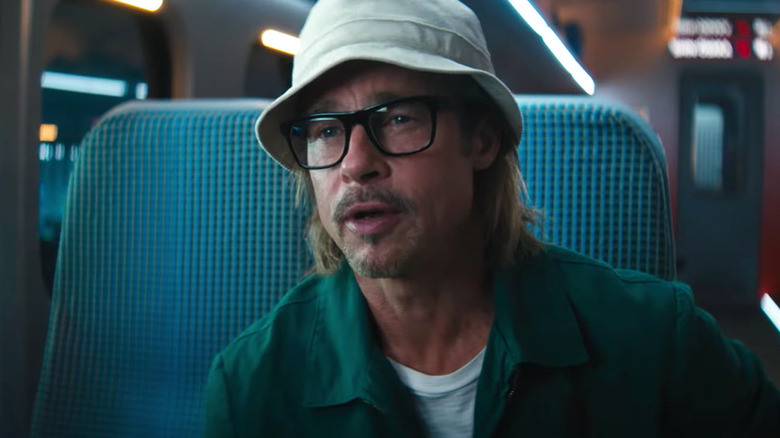Bullet Train Review: A Slick, Glib, Moderately Entertaining Adventure
When the end credits roll on "Bullet Train," it's almost a shock to not see Guy Ritchie listed as the director. Though it would be easy to sit through this two-plus-hour film in which a motley assortment of assassins swap lengthy monologues as well as bullets with ease as a lengthy post-post-modern riff on the works of Quentin Tarantino, "Bullet Train" seems much more heavily indebted to films like "Lock, Stock, and Two Smoking Barrels" and "Snatch," which were, of course, themselves post-post-modern riffs on the works of Quentin Tarantino. Perhaps it's that Brad Pitt, who co-starred in "Snatch" more than 20 years ago, headlines this new actioner, or perhaps it's that some of the actors leapt into their one-dimensional characters with headlong glee so they can pull out a cartoonish accent or two. But "Bullet Train," like those early Ritchie films, is exceedingly glib and at least moderately entertaining, though it would be ideal for the order to be reversed.
Pitt here plays a criminal of some sort who receives his new code name at the start of the picture, hereby known as Ladybug. Ladybug is just getting back into the world of crime after some time away, during which he attempted to unearth some semblance of peace with a therapist. But his handler (primarily an offscreen figure voiced by Sandra Bullock) has given him a purportedly easy gig to return to the fold: all he has to do is take a briefcase from a bullet train heading from Tokyo to Kyoto. It seems simple enough, except every time Ladybug tries to leave the train, he's fated to stay. There's a mysterious Mexican assassin with vengeance on his mind, known as The Wolf (Benito A Martinez Ocasio); there's The Prince (Joey King), who looks like a prim English schoolgirl but is basically a sociopath; a pair of twins nicknamed Tangerine and Lemon (Aaron Taylor-Johnson and Brian Tyree Henry); and on and on and on.
"Bullet Train," whose script is credited to Zak Olkewicz, is based on a novel by Kōtarō Isaka, a point worth noting if only because it's enough to wonder how much of Olkewicz's script is faithful to its source or indebted to other seeming inspirations. The film's constant jumps to and from the eponymous train to either show us glimpses of various characters' pasts — either recent or distant — as well as bouncing to and fro in time with heedless abandon seems more like a way to speed up the story without emphasizing how little movement there really is. David Leitch directed "Bullet Train," and though he's well-known for his work with fellow director/stunt performer Chad Stahelski on the first "John Wick" film, this movie is much more in line with Leitch's direction of "Deadpool 2," for good and mostly ill.
A movie that's very pleased with itself
Being like "Deadpool 2" means a number of things for "Bullet Train." On the less vexing end, it means a number of random cameos from very famous people, such as the aforementioned Bullock. (You may recall that "Deadpool 2" had an unexpected cameo from Pitt himself, a fact that you may wish to consider regarding what cameos there may or may not be here.) Unfortunately, it also means that a good chunk of the action sequences in "Bullet Train" often borderline visually incomprehensible. It's a testament to the actors among the ensemble that any of the characters are worth rooting for in the hopes that they'll survive a given sequence or even the entire film, because the action sequences themselves, from bloody battles to various hand-to-hand fight scenes, are chopped and edited within an inch of their life.
Though Pitt is the ostensible lead, it's Aaron Taylor-Johnson and Brian Tyree Henry who find a fine balance between being smug and being a lot of fun. Their brotherly connection — joked about due to the fact that one of them is white and the other is Black — as well as one of the characters being obsessed with a children's TV show heavily at odds with this film's R-rated content could easily make the duo insufferable, but their plight as well as the genuine commitment both actors bring to roles that could easily be laughed off makes their performances stand out. Tangerine and Lemon start out feeling like also-rans from an early-2000s mob movie, but end up basically stealing this. It's not that Pitt is bad, of course — he's mostly fun in a role riffing on the idea of the hitman who badly wants out but just can't get away, though there are some moments where his character's glibness is genuinely unpleasant, as when another assassin is writhing in their final bloody moments and he's half-assedly asking if they want a glass of water as a last request.
"Bullet Train" is, by and large, very pleased with itself and only sometimes earns that level of pleasure. Like the train on which it is mostly set, the film is fast and zippy, fittingly only slowing down to a turgid pace when the train comes to a stop. Leitch keeps the tone light and loose, sometimes to the film's detriment when the action is just a bit too grim to match such a laid-back, at-ease quality. Considering the majority of modern mainstream fare, we can look at "Bullet Train" as a mild win, a presumably high-budgeted action film that boasts no superheroes, no extended universes, nothing like that. But though this film clears that low bar, "Bullet Train" is only ever mildly fun, while reminding you of movies that are often a whole lot better.
/Film Rating: 6 out of 10

